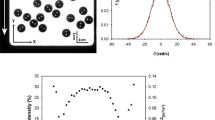Abstract
Rotational relaxation times (τ) of anisotropic tungstic acid colloids in aqueous suspension containing sodium chloride or ethyl alcohol are studied in microgravity achieved by free-fall experiments. Experimental errors at 0 G, in many cases, are small compared with those at 1 G, which is ascribed to the lack of the convection of suspension in microgravity. Much more reliable data of the diffusion coefficients are obtained in microgravity. The limiting slopes of the relaxation curves in the plots of the transmitted-light intensity against time at 1 G depend on the flow direction of the suspension in the flow cell, whereas those at 0 G are close to zero irrespective of the flow direction. Sodium chloride decreases τ, whereas ethanol addition increases this time. These effects are ascribed to the thinning of the electrical double layers and to the increase in the suspension viscosity.
Similar content being viewed by others
Author information
Authors and Affiliations
Additional information
Received: 5 July 2000 Accepted: 21 September 2000
Rights and permissions
About this article
Cite this article
Tsuchida, A., Yoshimi, H., Ohiwa, K. et al. Rotational diffusion of tungstic acid colloids in microgravity studied by free-fall experiments. Effects of sodium chloride and ethyl alcohol. Colloid Polym Sci 279, 427–433 (2001). https://doi.org/10.1007/s003960000435
Issue Date:
DOI: https://doi.org/10.1007/s003960000435




